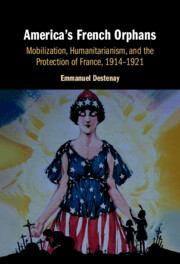Book contents
- America’s French Orphans
- America’s French Orphans
- Copyright page
- Dedication
- Contents
- Figures
- Maps
- Preface
- Acknowledgments
- Note on the Text
- Select Biographies of Those Involved in Providing Relief to France’s Orphans
- Introduction
- Chapter 1 Rescuing and Sheltering
- Chapter 2 Mobilizing Support for France’s Fatherless Children
- Chapter 3 Defending the Future of France
- Chapter 4 Writing in Wartime
- Chapter 5 Peace, Remobilization, and Memorialization
- Chapter 6 Rebuilding Devastated France
- Conclusion
- Appendices
- Bibliography
- Index
Introduction
Published online by Cambridge University Press: 24 October 2024
- America’s French Orphans
- America’s French Orphans
- Copyright page
- Dedication
- Contents
- Figures
- Maps
- Preface
- Acknowledgments
- Note on the Text
- Select Biographies of Those Involved in Providing Relief to France’s Orphans
- Introduction
- Chapter 1 Rescuing and Sheltering
- Chapter 2 Mobilizing Support for France’s Fatherless Children
- Chapter 3 Defending the Future of France
- Chapter 4 Writing in Wartime
- Chapter 5 Peace, Remobilization, and Memorialization
- Chapter 6 Rebuilding Devastated France
- Conclusion
- Appendices
- Bibliography
- Index
Summary
In December 1916, in the winter snow of New York State, while Americans busied themselves with Christmas shopping and prepared festivities, a skinny twelve-year-old boy, poorly dressed and in ragged shoes, shouted at the top of his lungs: “Buy a Mirror fer a kid in France!” Every evening after school, James Prendergast Jackson Jr. stood on a street corner and sold copies of the newspaper to earn enough money to sponsor a French child whose father had been killed in the war in France. One of six children in a working-class family, James was determined to assist a child across the ocean who, as he had learned in school, desperately needed food and clothing. Ten cents each day would secure those necessities, and James promised himself he would get those 10 cents selling newspapers. He sold seventy copies of the paper a day, for which he earned 35 cents. From Greenville, New York, James wrote to the secretary of the Junior Committee of the Fatherless Children of France Society (FCFS) – the Franco-American organization matching American “godparents” with French children whose fathers had been killed in the war – and announced his intention of “adopting” a brother in France. With candor and determination, James announced his choice of child to support with his earnings: “I wood like a boy between ten and twelve if it is the same to you.” Attached to the letter was 85 cents that he had been given for his birthday. James was assigned André Leblanc, aged eleven, rue Dautancourt, Paris.
- Type
- Chapter
- Information
- America's French OrphansMobilization, Humanitarianism, and the Protection of France, 1914–1921, pp. 1 - 17Publisher: Cambridge University PressPrint publication year: 2024

